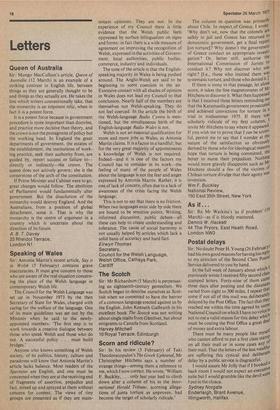Speaking of Wales
Sir: Antonia Martin's recent article, Say it in Welsh (5 February) contains grave inaccuracies, It must give concern to those who are aware of the real situation concerning the place of the Welsh language in contemporary Welsh life.
The Council for the Welsh Language was set up in November 1973 by the then Secretary of State for Wales, charged with caring for the welfare of the language. One of its main guidelines was set out by the Minister when he said to the newlyappointed members: 'The first step is to work towards a creative dialogue between those who speak Welsh and those who do not. A successful policy . . must build bridges.'
Anyone who knows something of Welsh society, of its politics, history, culture and paradoxes will know that Antonia Martin's article lacks balance. Most readers of the Spectator are English, and one must be concerned when they are at the receiving end of fragments of assertion, prejudice and fact, mixed up and sprayed at them without concern for context. The views of tiny groups are presented as if they are main
stream opinions. They are not. In the experience of my Council there is little evidence that the Welsh public feels oppressed by surface bilingualism on signs and forms: in fact there is a wide measure of agreement on improving the recognition of Welsh, expressed in the activities of Government, local authorities, public bodies, commerce, industry and individuals.
The tone of the article is that the Englishspeaking majority in Wales is being pushed around. The Anglo-Welsh are said to be beginning to scent coercion in the air. Extensive contact with all shades of opinion in Wales does not lead my Council to that conclusion. Nearly half of the members are themselves not Welsh-speaking. They do not feel coerced. In the article the birth of the Welsh-language Radio Cymru is mentioned, but the simultaneous birth of the English-language Radio Wales is not.
Welsh is not an essential qualification for more and more jobs in Wales, as Antonia Martin claims. It is a factor in a handful ; but for the very great majority of appointments a knowledge of Welsh is not required. Indeed—and it is one of the factors my Council has to consider in its work—the feeling of many of the people of Wales about the language is not the fear and anger expressed by Antonia Martin. Rather, it is one of lack of concern, often due to a lack of awareness of the crisis facing the Welsh language.
This is not to say that there is no friction. When two languages exist side by side there are bound to be sensitive points. Writing, informed discussion, public debate—all these can help to create understanding and tolerance. The cause of social harmony is not usually helped by articles which lack a solid basis of accuracy and hard fact.
Eirwyn Thomas Secretary, Council for the Welsh Language, Welsh Office, Cathays Park, Cardiff


































 Previous page
Previous page